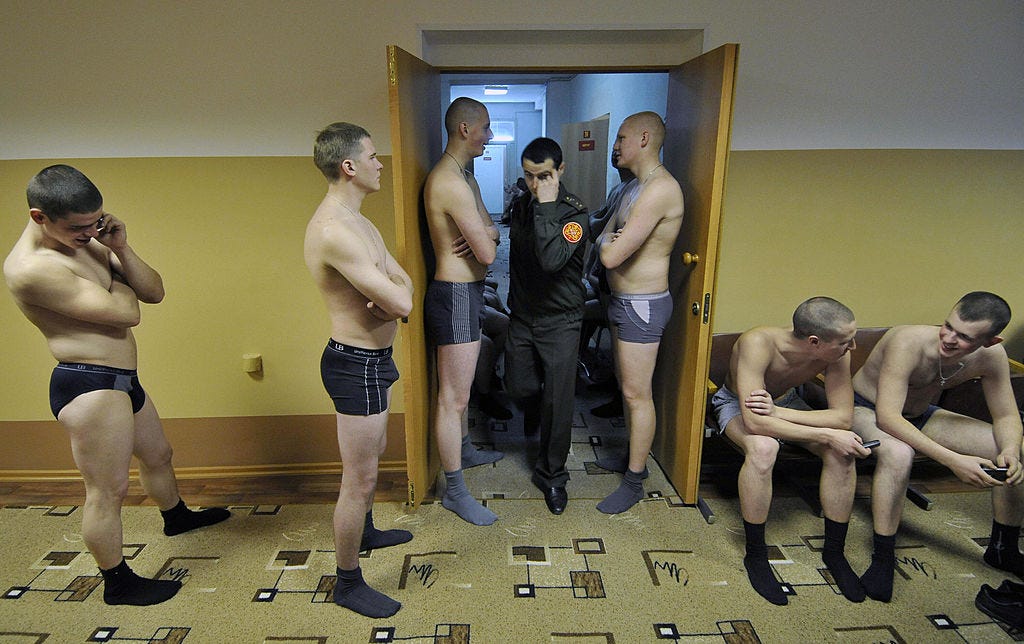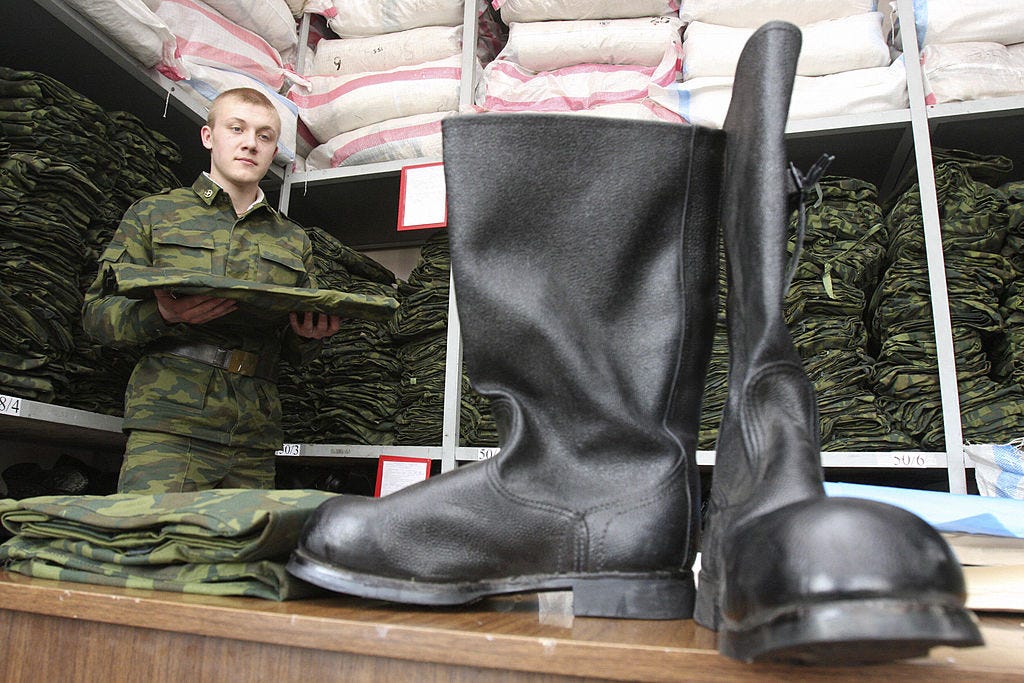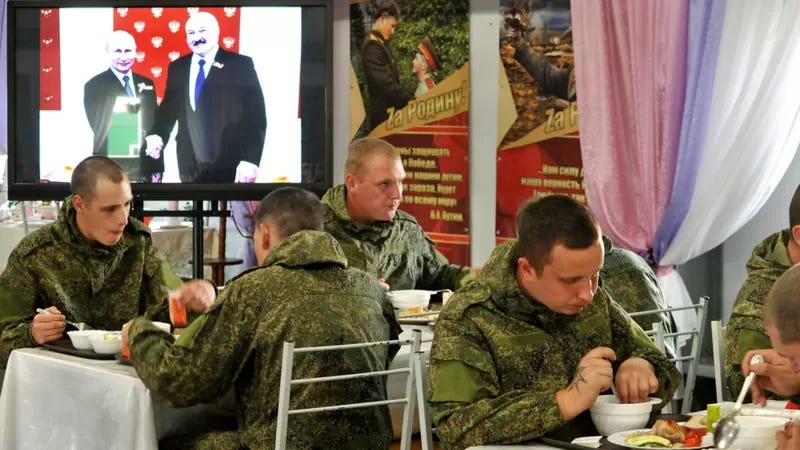The shocking scale of theft in the Russian army
Theft on an industrial scale – why the Russian army’s supply shortages are often self-inflicted. BBC Russian investigates.
By Andrei Zakharov
Troops newly-mobilised for the war in Ukraine are being forced to pay for their own kit as army supply depots run low on everything from uniforms and boots, to flak-jackets and night-vision equipment. As questions are asked in the Russian Duma about what’s going on, BBC Russian has discovered that one possible reason is theft – by serving soldiers, in army bases all across the country. And as court documents show, some of it is happening on an almost industrial scale.
In the middle of July, as Russian troops were launching an assault on a thermal power plant in Luhansk region, a military court on a remote island in the Russian Far East was preparing to hear a new case.
In the dock was a man called Dmitri Gorin, the chief uniform supply officer at the Kurilsky military garrison. He was accused of issuing two fake invoices which had enabled two fellow soldiers to walk away with a sizeable consignment of military clothing.
The stash included 100 hold-alls, three balaclavas, four summer service caps, two sets of wind-and water-proof clothing, 35 t-shirts, 50 pocket handkerchiefs, about 500 pairs of winter and summer socks, and one pair of summer boots.
In court, Gorin claimed that the items had all been damaged by poor storage conditions in the army warehouse. He said he didn’t want to just write them off, because he was afraid questions would be asked about why he hadn’t done something to deal with the problems. So, he decided to offload the items quietly by issuing fake invoices. The court was sympathetic to his defence and let him off with a 25,000 rouble fine (roughly 400 USD).
Another uniform supply officer on trial in a similar case the previous year was not so lucky.
Senior Lieutenant Ilgiz Akhmetov, from an engineering unit in Murom, in Vladimir region, got a two-year suspended prison sentence, at the end of 2021, after being convicted of smuggling truckloads of kit out of his military base.
The court heard that in the spring of 2018, Akhmetov stole 200 pairs of summer boots from an army warehouse, and used them to pay off a debt. He then took another 100 pairs of boots to make some extra cash. In order to cover his tracks, he then issued a fake document writing off the missing footwear as ”worn out”.
The prosecutions of Gorin and Akhmetov are just two recent examples of the long-standing and serious problem of theft inside the Russian army.
It’s a situation that’s clear to see online in the official court archives stored in Russia’s ‘Justice’ electronic database.
Over the past eight years, since the Russian annexation of Crimea, the BBC has found that Russian military courts have handed out more than 550 sentences to military personnel convicted of selling equipment from army supply depots.
Public awareness of this issue would have remained fairly low if it hadn’t been for the Russian invasion of Ukraine, and Vladimir Putin’s subsequent ’partial mobilisation’ order.
It was mobilisation in particular that exposed the Russian army’s failure to provide even the most basic kit for new recruits. Families of mobilised men found themselves having to buy everything from boots, balaclavas, socks, rucksacks and uniforms, to body armour, first-aid kits and even night-vision devices.
In a post widely shared on Russian social media, the wife of one new recruit wrote that her family had spent 30 thousand roubles – the equivalent of nearly 500 US dollars to buy him a uniform, rucksack, medication and food.
State Duma deputy Andrei Gurulev, a vocal supporter of the war in Ukraine, and a lieutenant-general in the reserve, took to Telegram to express his frustration about the situation.
“I don’t understand how 1.5 million sets of kit can have vanished from military stores,” he wrote. “Where have all these problems with uniforms come from, and what’s caused them? There’s just no explanation!”
Gurulev and fellow Duma deputy, Vasily Piskarev, later appealed to the prosecutor general, Igor Krasnov, to look into the situation. How can it be that money is pouring into the budget year after year, and yet the army is penniless, they asked.
Years of stealing
“There are plenty of ways to steal equipment in the army,” says a military journalist, and former Russian army officer, who agreed to speak to the BBC on condition of anonymity. “You can falsify stock lists, or simply write off items that are actually still in good condition, maybe citing mould as the reason.”
“Another quite popular tactic is shifting the blame down the chain of command,” he continued. “I knew someone who ended up in prison that way. He arrived in our unit, signed up to handle the stock lists, and then there was an inventory check and shortages came to light. He went to jail.”
Cases from the court archives highlight a breath-taking level of theft all over Russia, from small-scale one-off incidents involving low-level personnel, to industrial scale plundering by senior officers.
Vladimir Morzhakov and Egor Medvedev, were conscripts from a motorised rifle unit in the city of Klintsy in Bryansk region.
They were called up in the summer of 2021. We have no way of knowing how good or bad they were as soldiers, but one sunny day, Morzhakov and Medvedyev slipped into the stockroom of their own unit and helped themselves to some clothing.
The gates to the stockroom were padlocked, but the gap between the panels was wide enough for the pair to prise open one of the gates. Medvedev crawled through it and Morzhakov stayed outside on lookout. His friend soon returned with an armful of stolen items - a couple of caps, some boots, a pair of trainers, three sets of bedlinen and four ‘Russian Army’ sports jackets.
In March 2022, after the start of the war in Ukraine, they posted these jackets to some relatives. When the two conscripts were found out, they quickly rang home to ask for the items to be sent back. Both were given relatively lenient punishments for theft.
In Novosibirsk region in 2022, at exactly the same time that the Russian army was advancing on Kyiv, two officers from an anti-aircraft unit found themselves in the dock on charges of stealing military property.

Captain Vladimir Zaitsev, and chief uniform supply officer, Ensign Alexei Churyukanov, were accused of systematically selling off equipment under their supervision.
The long list of items they were accused of stealing included 60 summer field uniforms, and caps, 50 sets of bedlinen and 20 pairs of boots, cotton thread, toilet paper, 50 paper envelopes, fax rollers, 36 thousand clear plastic A4 file pockets, and bottles of liquid soap.
The total cost of the stolen items was 1.5 million roubles - the equivalent of nearly 25,000 US dollars. There was so much of it that they had to enlist the services of a colleague to help drive it all on out a military truck.
Captain Dmitri Nikitin of the Novosibirsk Higher Military Command School helped them find buyers for the stolen items, some of which were stored in his garage.
All three men were found guilty and fined.
Other items up for grabs
It’s not just clothes and shoes that have been going missing from Russia’s military units, but also vital personal protective equipment.
Many troops recruited under the latest mobilisation drive are having to buy their own body armour because the army doesn’t have enough for everyone. It’s likely there would have been more to go round if it hadn’t been for people like Sergeant Ivan Andreyev from a tank brigade in Nizhegorod region.
In 2017 Sergeant Andreyev managed to steal nearly 50 flak-jackets,. Some were carried out of the base on army stretchers, and others were thrown out of windows to avoid awkward questions at security checks.
In 2018, a company commander at a motorised rifle company in Buryatia, realised that 20 flak jackets and an even larger number of good quality miltary helmets had disappeared from the company stores. As he pondered what to do, one of his subordinates, a Sergeant Major Artem Akimov, offered what seemed the perfect solution. A friend of his had come by a consignment of flak jackets identical to the ones missing from the base, and was willing to sell them for a good price.
Desperate to sort things out before anyone higher up noticed, the commander transferred 40 thousand roubles – the equivalent of more than 650 US dollars. The court records don’t specify exactly what happened next, but although Akimov received the money, the flak jackets weren’t delivered, and the commander eventually reported him to the military authorities.
In addition to clothing and protective equipment, fuel is also another item that regularly disappears from military bases. And this too is having an impact on the Russian army’s performance in Ukraine.
Military experts say one of the reasons why so much Russian military hardware is abandoned on the battlefield, is that vehicles have simply run out of petrol. It’s a problem which even pro-Kremlin war correspondents complain about openly in their reports.
A recent court case in the Altai autonomous republic, is a good example of what’s been going on. Aleksey Kudelya, a senior technician for material and technical provision at a military base in the region, used a military truck to systematically steal diesel fuel. He would take two or three barrels at a time, but ended up relieving the army of 2500 litres of diesel. He managed to sell off part of the fuel, and kept the rest on his own property out of town.
On top of this, he stole almost two thousand tons of oats from his unit, and various spare parts.
Stealing fuel is a fairly common crime among military tank units. One military expert, who monitors the state of tank units, told the BBC that for years now, only small amounts of the budget that is meant to be split between tank maintenance and running the tanks has actually reached certain units, with the money apparently getting stuck higher up.
“The money that did get through was then stolen at a lower level, and what was left of it was just spent on painting the tanks,” he said. “Fuel and lubricants were also stolen, so the tanks weren’t driven anywhere for years. When they eventually broke down and were no longer usable, people would strip them for valuable parts. It’s no surprise really that Russian tank units are now unable to carry out these offensive campaigns [in Ukraine].”
Thousands of prosecutions
In the eight years since the annexation of Crimea and the subsequent war in eastern Ukraine, economic crime has spread like a disease through the Russian army.
“Good old-fashioned army theft is just so easy,” says one military journalist and supplies officer who asked to remain anonymous. “There are so many ways to do it. At a basic level, you can just take a few extra things home with you. Going up a notch, you can drive off in a truck full of uniforms stuffed in sacks. At the third level, we’re talking billions of roubles worth of stuff.”
According to the ’Justice’ database (recording court cases in Russia), over the past eight years an average of 1000 service personnel were caught stealing every year. Shockingly, around half of these cases involve soldiers stealing personal items like mobile phones from each other.
More than 12,000 of the sentences handed down have been for fraud; in 2018 and 2019 there were more than 2000 such sentences each year.
Overall more than 700 soldiers serving on contract - including some commanders, have been found guilty of embezzlement.
One of the reasons theft is so widespread, is that the Russian army still doesn’t have modern accounting systems or storage management software to deal with equipment and supplies.
“You can’t fight a war without fuel and lubricants,’ the military journalist told the BBC. “But there’s no proper system to record supplies. They still just write everything down in notebooks, which makes it really hard to go through and check what’s written in one unit’s records and what’s elsewhere.”
It’s extremely difficult – and risky for external organisations to raise questions about corruption in the armed forces.
Ilya Shumanov heads the Russian branch of corruption watchdog Transparency International, which has been branded a foreign agent by the Justice Ministry.
He told the BBC that by 2022 the army was effectively ‘closed off’ to outsiders. Public procurement information is private, no income declarations are published, and if you try to investigate the Russian army for corruption, you might find yourself labelled a foreign agent, or even charged with treason, he told the BBC.
“Time and again, the same catch-all reason is given for restricting access to information: it’s classified,” he said.
His frustration was echoed by a military journalist, who told the BBC he had no doubt that what we found in the court archives was only a pale reflection of the real situation.
“Nobody really wants to shine a spotlight on this. They don’t want to mess with the thieves,” he said. “Most likely, these court statistics are just the tip of the iceberg of corruption that is the Russian army.”
Read this story in Russian here.
Translated by Elsa Haughton.








